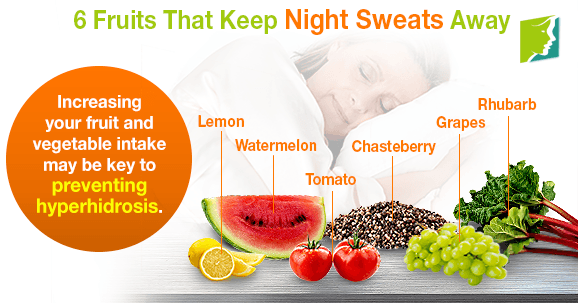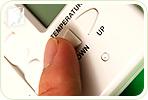Nocturnal hyperhidrosis - better known as night sweating - is a sleep-disrupting and unpleasant symptom of menopause wherein the sufferer awakens to find themselves coated in cold sweat. Although menopausal hyperhidrosis is primarily derived from hormonal imbalances, diet also plays a huge part in the way our bodies function, and what you eat could be triggering or exacerbating your night sweats. Increasing your fruit and vegetable intake may be key to preventing hyperhidrosis; certain plants contain hydrating compounds and healthy fibers that could significantly reduce sweating episodes. Eating more of these fruits and vegetables could help you experience sweat-free sleep.
Grapes
The key to choosing fruits that keep night sweats away is to look for the ones that contain high quantities of water. Grapes are 80% water, meaning they have a hydrating effect in the body, which can help you maintain a consistently cool internal body temperature to reduce the likelihood of sweating.
Chasteberry
Chasteberry - also known as Vitex agnus-castus - is an herb that is commonly used in association with menopause-related symptoms. This is due to its phytoestrogenic content. Phytoestrogens restore levels of estrogen that are decreasing in the body during menopause. This helps to rebalance hormone levels and regulate symptoms caused by imbalances, including night sweats. Try using chasteberry supplements or drinking herbal teas in the early evening to keep sweating episodes away.
Tomato
Like grapes, tomatoes are 80% water so, raw or juiced, they have a hydrating and cooling effect on the body to help keep night sweats away.
Rhubarb
Rhubarb has sweat-relieving properties when applied topically to sweat-prone areas. This is due its tannin content; tannins have astringent properties, which means they cause the tissues in the skin to constrict and thereby prevent sweating. Rhubarb is also antimicrobial and fragrant to minimize and mask body odor from any sweating episodes that do occur.
Watermelon
The clue is in the name of the fruit, but watermelon has significant water content to hydrate the body and keep you cool. It also contains fiber, so it is easy to digest in the evening. Try it as a dessert after your evening meal to help keep sweats away.
Lemon
Although lemon cannot treat sweating itself, when lemon juice is applied topically to sweat-prone areas, it has an antiseptic effect to mask odor and help you to feel fresh, rather than clammy and unhygienic.
Increasing your intake of sweat-relieving fruits may be the first dietary adjustment you make to reduce nocturnal hyperhidrosis, but there are likely to be other additional changes to prevent night sweats, too. Try to cut out dietary stimulants, such as spicy foods - caffeine, and alcohol - in the evening, as these trigger sweating, and avoid eating dinner within two hours of going to bed. Aiming for a healthy, balanced diet that does not incorporate too many saturated fats is essential for overall health as well as for reducing night sweats.
Sources
- United States Department of Agriculture. (2002). Watermelon Packs a Powerful Lycopene Punch. Retrieved February 26, 2014, from http://www.ars.usda.gov/is/ar/archive/jun02/lyco0602.htm
- NYU Langone Medical Center. (n.d). Phytoestrogens. Retrieved February 26, 2014, from http://www.med.nyu.edu/content?ChunkIID=108298
- Shenefelt, P.D. (2011). Herbal Treatment for Dermatologic Disorders. In: Herbal Medicine: Biomolecular and CLinical Aspects. 2nd ed. Retrieved from http://www.ncbi.nlm.nih.gov/books/NBK92761/
- University of Maryland Medical Center. (2011). Grape Seed. Retrieved February 26, 2014, from https://umm.edu/health/medical/altmed/herb/grape-seed




